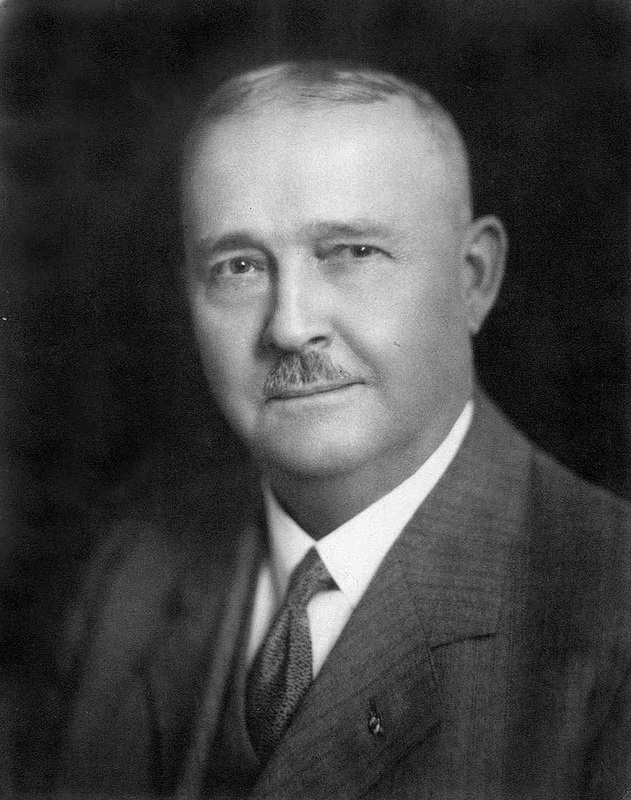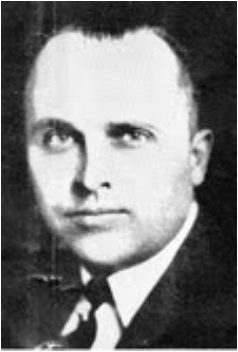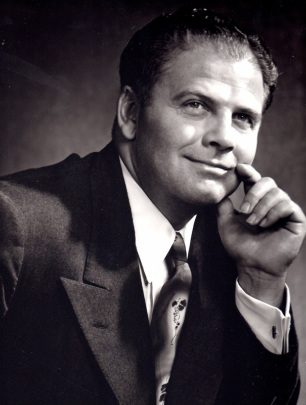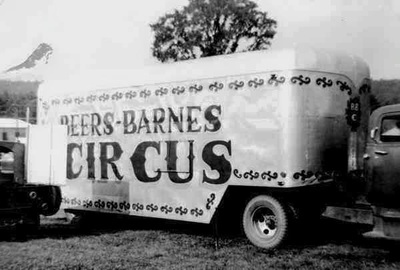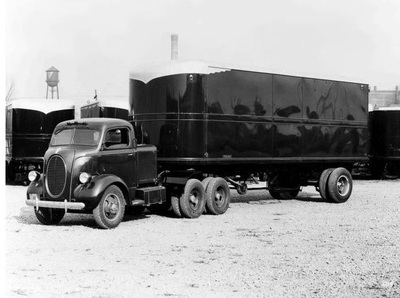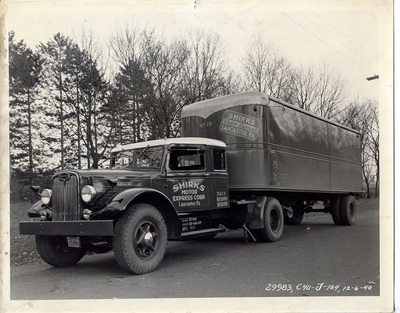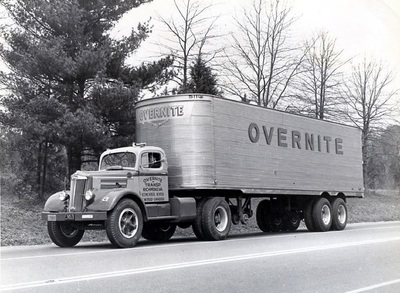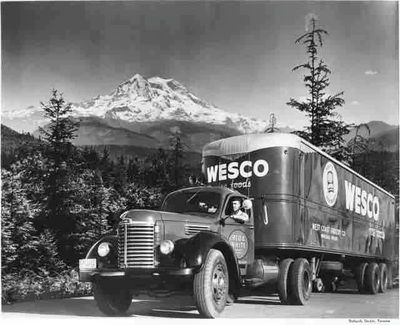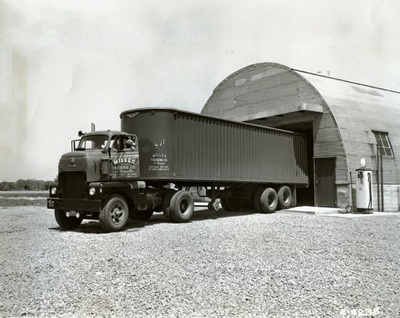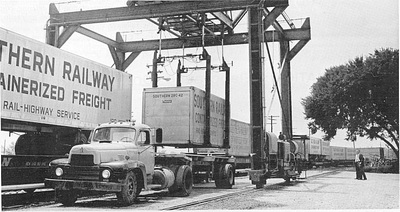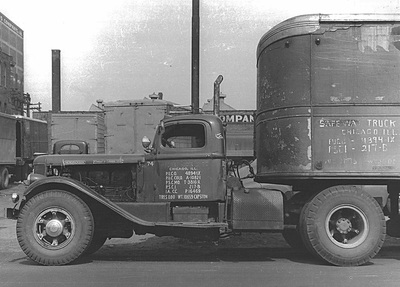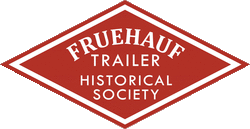The Internal Control for Power - Fruehauf Trailer Company
The Fruehauf Men who made the
Fruehauf Trailer Company and the one who betrayed them
Click the hyperlinked photos or title for more info
Harvey Fruehauf, second son of August, Fruehauf's founder, became embittered following his retirement. Vindictively, he sold all of his family owned stock to an outsider resulting in a very public and difficult proxy battle. This changed his relationship with his family forever. To read more about these details see Harvey''s double cross. The family feud between Harvey Fruehauf and the rest of his family lay the foundation for the eventual collapse of the company as this resulted in the loss of family control on the board. This power struggle for Fruehauf Trailer Company may have been sewn years before the ultimate proxy battle initiated by Harvey's sale of class 1 voting stock to an outside buyer.
Was Harvey embittered by August's will, which left the bulk of his fortune to older brother, Andrew, in classic old world fashion? Was Harvey, as the second son in constant competition with his brothers? Did Harvey clash with Roy over simple disputes in style or vision because of their 15 year age difference? Was Harvey unable to accept the successes of his younger sibling after he had retired and watched from the sidelines? Was it political and philosophical differences that separated the brothers?
This heartbreaking tale of family conflict that developed into hostility was unimaginable in the glamorous setting of the prosperity of post WWII America. The extraordinary success of the Fruehauf Trailer Company and its executives seemed indestructible.
Following the death of Roy Fruehauf in 1965, the board and executive officers mismanaged the company and it was bought in bankruptcy by Wabash Trailers in 1997. The company's reputation suffered and it continued to lose market share and profits during this era.
Was Harvey embittered by August's will, which left the bulk of his fortune to older brother, Andrew, in classic old world fashion? Was Harvey, as the second son in constant competition with his brothers? Did Harvey clash with Roy over simple disputes in style or vision because of their 15 year age difference? Was Harvey unable to accept the successes of his younger sibling after he had retired and watched from the sidelines? Was it political and philosophical differences that separated the brothers?
This heartbreaking tale of family conflict that developed into hostility was unimaginable in the glamorous setting of the prosperity of post WWII America. The extraordinary success of the Fruehauf Trailer Company and its executives seemed indestructible.
Following the death of Roy Fruehauf in 1965, the board and executive officers mismanaged the company and it was bought in bankruptcy by Wabash Trailers in 1997. The company's reputation suffered and it continued to lose market share and profits during this era.
Click the hyperlinked photos or title for more info
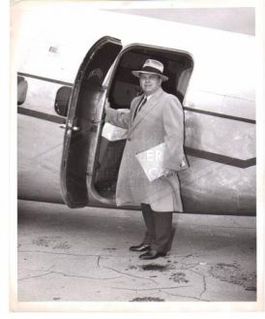 Roy Fruehauf, President, 1949 - 1964
Roy Fruehauf, President, 1949 - 1964
An Excerpt from Fruehauf, the First Name in Transportation
Ruth Fruehauf & Darlene Norman Soon to be published
Roy August Fruehauf was born in 1908 and ascended to the role of President of one of the most powerful industrial concerns after World War II.
Roy, the first of his siblings to go to college, entered the ranks of the family business at age 20 where he learned the trade from the ground up. The entire transportation industry was responding to rapid changes, given the innovations and expansions of the first half of the twentieth century. August Charles Fruehauf, the Fruehauf patriarch, was faced with a behemoth company after laboring for years as a simple blacksmith. August was of classic German stock and his family had immigrated to the United States in the late 1800’s.
August founded the blacksmith shop in old Detroit on Gratiot Avenue, his story was the American dream. As horse and wagon gave way to motor driven four-wheeled vehicles, August grew with the change. In 1914, a request from a neighbor to build a contraption that would haul his boat to the lake grew into the Fruehauf Trailer Company, which became a major corporation revered throughout the transportation industry. A Fruehauf trailer created with the dedication to quality and craftsmanship of German immigrants quickly became the industry standard.
By 1929, Fruehauf Trailer Company had sales of almost $4 million and had achieved unprecedented success. In 1930 August died, passing control of the company to his son Harvey. Harvey remained in the president’s seat until 1949 when, at age 56 he reluctantly passed the reins to his brother Roy, fifteen years his junior. Roy, who had been head of sales since 1938, and at the company for 23 years, was acutely familiar with the roller coaster of international sales. During his time as Vice President and Director of Sales, profits grew from his efforts and Roy recognized the need for innovation and expansion. Proposing new ideas to Harvey, Roy continued to meet with considerable resistance from his elder brother who was resistant to change.
Roy, who had a very different business style than his staid conservative older brother, had learned about business tactics during his time in University. He understood about expansion, risk and growth. One of his first mandates when he finally became President was to establish manufacturing branches throughout the US and later into Europe, positioning Fruehauf as a worldwide corporation. National dealerships in the U.S. included Des Moines, Cedar Rapids, Indianapolis, Houston, New Jersey and Fresno.
Roy’s background in sales was key as he had insight into the market place and knew his customer’s needs intimately. Harvey, who became the CEO, continued to armchair quarterback all key decisions, interfering and causing disharmony. The young Trailer President, who needed to be focusing on the responsibilities of his business obligations, was instead taking out valuable time to minister to the needs of an out of touch and obsolete retired executive. Friction developed as Harvey continued to interfere and failed to support his brother and board decisions. Over the course of the next four years a bitter power struggle progressed between the two brothers and their supporters. This ultimately destroyed the Fruehauf Trailer Company.
Harvey, embittered after he had been voted off the board unanimously, took drastic action. He decided to sell every share of his Fruehauf company stock, a lifetime accumulation, to corporate raider George Jerome Kolowich for $3,000,000 in 1953. This sale purposefully severed Harvey’s connection to the company, and attempted to give Kolowich controlling interest, which would unseat Roy.
Ruth Fruehauf & Darlene Norman Soon to be published
Roy August Fruehauf was born in 1908 and ascended to the role of President of one of the most powerful industrial concerns after World War II.
Roy, the first of his siblings to go to college, entered the ranks of the family business at age 20 where he learned the trade from the ground up. The entire transportation industry was responding to rapid changes, given the innovations and expansions of the first half of the twentieth century. August Charles Fruehauf, the Fruehauf patriarch, was faced with a behemoth company after laboring for years as a simple blacksmith. August was of classic German stock and his family had immigrated to the United States in the late 1800’s.
August founded the blacksmith shop in old Detroit on Gratiot Avenue, his story was the American dream. As horse and wagon gave way to motor driven four-wheeled vehicles, August grew with the change. In 1914, a request from a neighbor to build a contraption that would haul his boat to the lake grew into the Fruehauf Trailer Company, which became a major corporation revered throughout the transportation industry. A Fruehauf trailer created with the dedication to quality and craftsmanship of German immigrants quickly became the industry standard.
By 1929, Fruehauf Trailer Company had sales of almost $4 million and had achieved unprecedented success. In 1930 August died, passing control of the company to his son Harvey. Harvey remained in the president’s seat until 1949 when, at age 56 he reluctantly passed the reins to his brother Roy, fifteen years his junior. Roy, who had been head of sales since 1938, and at the company for 23 years, was acutely familiar with the roller coaster of international sales. During his time as Vice President and Director of Sales, profits grew from his efforts and Roy recognized the need for innovation and expansion. Proposing new ideas to Harvey, Roy continued to meet with considerable resistance from his elder brother who was resistant to change.
Roy, who had a very different business style than his staid conservative older brother, had learned about business tactics during his time in University. He understood about expansion, risk and growth. One of his first mandates when he finally became President was to establish manufacturing branches throughout the US and later into Europe, positioning Fruehauf as a worldwide corporation. National dealerships in the U.S. included Des Moines, Cedar Rapids, Indianapolis, Houston, New Jersey and Fresno.
Roy’s background in sales was key as he had insight into the market place and knew his customer’s needs intimately. Harvey, who became the CEO, continued to armchair quarterback all key decisions, interfering and causing disharmony. The young Trailer President, who needed to be focusing on the responsibilities of his business obligations, was instead taking out valuable time to minister to the needs of an out of touch and obsolete retired executive. Friction developed as Harvey continued to interfere and failed to support his brother and board decisions. Over the course of the next four years a bitter power struggle progressed between the two brothers and their supporters. This ultimately destroyed the Fruehauf Trailer Company.
Harvey, embittered after he had been voted off the board unanimously, took drastic action. He decided to sell every share of his Fruehauf company stock, a lifetime accumulation, to corporate raider George Jerome Kolowich for $3,000,000 in 1953. This sale purposefully severed Harvey’s connection to the company, and attempted to give Kolowich controlling interest, which would unseat Roy.
With the help of the other Fruehauf family members, friends and colleagues Roy would be victorious in the proxy battle. These telegrams and correspondence are a small fraction of the outpouring of support that Roy received from clients, family and friends.
Most poignant is a message from brother, Andrew Fruehauf, who says: "Dearest Roy, Heartiest Congratulations! It just had to be that way. Much love, Andrew"
Most poignant is a message from brother, Andrew Fruehauf, who says: "Dearest Roy, Heartiest Congratulations! It just had to be that way. Much love, Andrew"
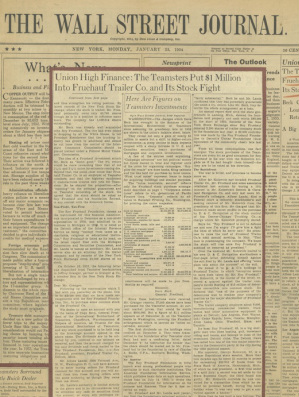 The story made national news and was featured on the front page of the Wall Street journal
The story made national news and was featured on the front page of the Wall Street journal
For the next decade Roy would do everything in his power to hold onto his family’s company. SINGING WHEELS chronicles these events. The battle would include consummating a huge loan with Dave Beck, President of the International Brotherhood of Teamsters, a decision that would cause repercussions Roy could not have imagined. He would be interviewed by the FBI, interrogated by Robert Kennedy at the McClellan hearings on racketeering, named in an indictment filed by the Justice Department and held to answer in a jury trial before the Supreme Court. This trial was a landmark case, generating the current RICO law. Roy Fruehauf was eventually exonerated of all charges.
This heartbreaking tale of family conflict that developed into hostility was unimaginable in the glamorous setting of the prosperity of post WWII America. The extraordinary success of the Fruehauf Trailer Company and its executives seemed indestructible. Roy routinely socialized with the business tycoons of the day, advised government officials, including Dwight D. Eisenhower, and helped to shape today’s multi-million dollar transportation and shipping industry. Popular entertainers of the day, Guy Lombardo and Roy Rogers considered him a friend. As a result of the family feud, Roy’s world would crumble over the course of 12 years. He died in 1965 leaving his estate in bankruptcy.
This heartbreaking tale of family conflict that developed into hostility was unimaginable in the glamorous setting of the prosperity of post WWII America. The extraordinary success of the Fruehauf Trailer Company and its executives seemed indestructible. Roy routinely socialized with the business tycoons of the day, advised government officials, including Dwight D. Eisenhower, and helped to shape today’s multi-million dollar transportation and shipping industry. Popular entertainers of the day, Guy Lombardo and Roy Rogers considered him a friend. As a result of the family feud, Roy’s world would crumble over the course of 12 years. He died in 1965 leaving his estate in bankruptcy.
What was formerly Fruehauf Trailer Company no longer exists, destroyed by the very people entrusted with its care. The rise of a small family owned enterprise to a global behemoth is truly the American dream. Greed, pride and manipulative controls for power are the substance for a Shakespearian tragedy and became the reality for the Fruehauf Trailer Company in the 1960’s. The undoing of a great durable giant, destroyed by all too human vice turned the American dream into the American nightmare. Can wealth be passed from generation to generation? Can power struggles be averted when power is passed along? How can companies that had achieved such global success and recognition fall into obscurity as the result of mismanagement and failed leadership? How can a brother destroy everything he has worked towards in order to retaliate against a younger smarter sibling? These are the questions that will be explored in SINGING WHEELS set against the backdrop of the early American industrial age filled with glamor, style and panache of one of the most opulent and exciting eras in U.S. history. Many can relate to sibling rivalry, envy, pride and greed, and one can be fascinated to see the dark side of these vices that swallow up careers, lives and corporations. Oh how the great fall…
The brand name, Fruehauf Trailer Company is still recognized as one of quality, craftsmanship and dedication to excellence.
The brand name, Fruehauf Trailer Company is still recognized as one of quality, craftsmanship and dedication to excellence.
Click these Buttons for more info

